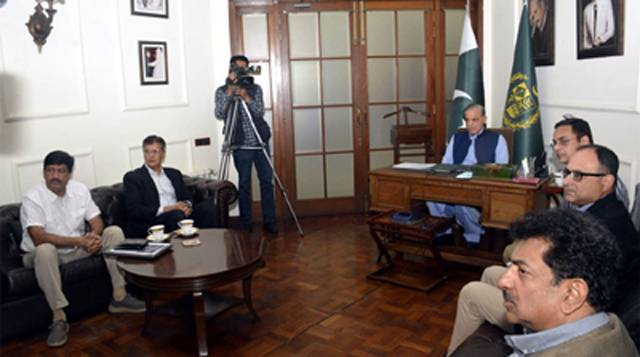Shehbaz says this initiative will give maximum benefit to farmers n Shows satisfaction over 27.5m metric tons bumper wheat production n Directs for strict action against hoardersn Govt committed to ensuring well-being of labourers, workers.
ISLAMABAD - Prime Minister Shehbaz Sharif said on Sunday that the provincial and federal departments should directly purchase wheat from farmers in order to provide them maximum benefit and minimize the role of middle man. “The government should also increase the procurement targets of wheat, so as to ensure its uninterrupted supply throughout the year,” said the prime minister while chairing a meeting held here to review the countrywide wheat procurement drive at the official level, PM Office Media Wing said in a press release.
He attributed the production of 27.5 million metric tons record bumper wheat crop in the country to government’s efforts at timely decisions, provision of quality seed, interrupted supply of fertilizer and Kissan package.
Expressing his satisfaction over the country’s produce which surpassed production during the previous ten years, the prime minister thanked Allah Almighty for the blessing.
He, however, directed for strict action against hoarders. He also directed for provision of required resources through banks to get a specified quantity of wheat.
The meeting was informed about the production of wheat in the current year, its available stock, carry forward stocks and the procurement targets of the federal and provincial departments. The meeting was attended by Minister for National Food Security Tariq Bashir Cheema, PM’s Adviser Ahad Khan Cheema, Special Assistant Tariq Bajwa, Caretaker Punjab Minister for Industries SM Tanveer and other senior authorities.
The prime minister congratulated the minister for food security and other relevant authorities and appreciated their steps. He said that despite heavy rainfalls and floods last year, achieving a bumper wheat crop was the result of the government’s timely decisions and the best governance.
Felicitating the nation on achieving the milestone, the prime minister said that the government was formulating a strategy for achieving enhanced production next year.
Due to mismanagement of the previous government, Pakistan became a wheat-importing country, he said, adding the farmers were made to wait in long lines for the whole day to get fertilizers.
Meanwhile, in a message on the International Workers Day, which is being celebrated globally on May 1, the prime minister, while highlighting the workers’ pivotal role in the economic development, reiterated that the government was committed to ensuring the benefits of economic progress translated into prosperity for all sections of the population, particularly the labourers and workers.
He said that this day reminded them of the sacrifices of those workers who laid down their lives while waging a relentless struggle for their rights.
The day symbolized the sanctity and dignity of labour and at the same time, it was an acknowledgement of the importance of workers and labourers for being central to the economic growth of the country, he added.
Paying tributes to the working classes for their contributions to the development of the country, he called upon all the stakeholders to renew their pledge both at the individual and collective levels to ensure the welfare of working classes by investing in their socio-economic and social well-being.
The prime minister further said “Our great religion, Islam, emphasizes the principles of social justice, equity and respect for the rights of the people. Allah Almighty and the Holy Prophet (Peace Be Upon Him) have ordered us to fulfill the rights of the workers and not be lax in the performance of this core duty,” he added.
He said they found numerous inspiring examples of the dignity of laborer and respect for the rights of the working classes in the life of the Holy Prophet (PBUH).
“Respect for hard work and recognition of the rights of workers are extremely important in the process of progress. Islam accorded the sanctity to these fundamental human rights much before the establishment of labour laws,” said the press release issued by the PM Office Media Wing quoting him as saying.
On the same ground, the prime minister said, they believed that workers and employers were partners in the production process and their cooperation and amicable relationship was essential for the socio-economic development of the country.
He said that the present government was committed to improving the working and living conditions of workers and to supplement their welfare by providing better housing, education facilities and health cover for them and their families.
Keeping in view the high inflation rates and other economic challenges, the government had increased the minimum wages of workers from Rs. 17,500 to 25,000 per month, he said, adding that it also aimed to develop automated, integrated systems for workers’ welfare institutions to ensure transparency and to curtail delays in providing relief to the labourers and workers.
Keeping in view the requirements of the labour market, the prime minister further said that the present government had embarked upon programmes of vocational training and skills development to enable workers to get their due share in job markets within and outside the country.






